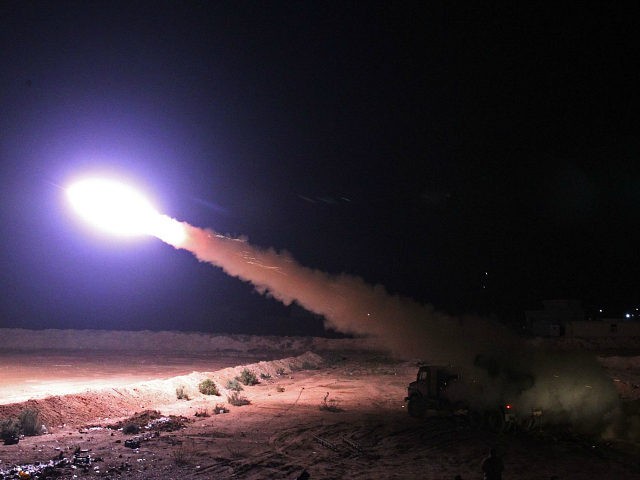Three missiles struck a military base housing local and American troops north of Baghdad late on Monday, the Iraqi armed forces confirmed, without elaborating further.
Citing an unnamed source who echoed other news accounts of the incident at the sprawling Taji military base, Reuters notes that the shelling did not cause any casualties.
Consistent with other news reports, the Iraqi Kurdish Rudaw news outlet adds that the attack marks the second assault on a military installation in Iraq in four days.
The Associated Press (AP) notes:
The late Monday attack on Camp Taji, about 27 kilometers (17 miles) north of Baghdad, is the second on a military post housing U.S. personnel. An attack on an airbase, also housing U.S. trainers, north of Baghdad on Saturday caused a small fire.
In a brief statement issued late on Monday, the Iraqi military’s media cell said, “A short while ago, three Katyusha missiles landed on Camp Taji.”
“Two military officials speaking on condition of anonymity because [the] investigation is still underway said the rockets landed near an Iraqi air defense unit,” AP reports.
No specific group claimed responsibility for the attack.
The attacks on the Iraqi military installation, however, came amid tensions between the United States and Iraq’s neighbor Iran in the wake of crippling sanctions imposed by U.S. President Donald Trump’s administration.
Iraq is home to tens of thousands of pro-Iran militiamen, namely members of the Baghdad-sanctioned umbrella organization known as the Popular Mobilization Forces (PMF).
In November 2018, the Pentagon inspector general (IG) indicated that pro-Iran militiamen “likely” carried out two attacks against American targets in September of last year: mortars that landed near the U.S. Embassy in Baghdad and rocket attacks fired at the Basrah Airport near the U.S. Consulate General.
U.S. officials condemned Iran for the attacks, warning that Tehran would be held responsible for attacks by its proxies targeting American troops and facilities.
Now, Reuters notes:
U.S. officials said last month there was an increased threat from Iran-backed militias against U.S. interests in Iraq, and the U.S. embassy in Baghdad evacuated hundreds of staff.
Washington and Tehran have both said they do not want conflict, but analysts warn that incidents including by what they call “rogue elements” within Iran-backed armed groups could lead to a wider escalation.
Rudaw adds:
The assailants of the attacks are unknown, but many Iran-affiliated Iraqi Shiite militias are currently active in Iraq and are thought to be responsible. … Iraq has sought a de-escalation of tensions, repeatedly saying that it wishes to avoid being caught in the crossfire of a possible US-Iran conflict.
The Trump administration has expanded its Syria mission to include the removal of Iran and its proxies. Syrian dictator Bashar al-Assad was able to reconquer most of the war-ravaged country and remain in power with the support of Iran and Russia.
On Monday, U.S. Acting Secretary of Defense Patrick Shanahan authorized the deployment of an additional 1,000 troops to the Middle East at the behest of U.S. Central Command — charged with American military activity in the region.
In a statement, the Pentagon chief said:
The recent Iranian attacks validate the reliable, credible intelligence we have received on hostile behavior by Iranian forces and their proxy groups that threaten United States personnel and interests across the region.
The United States does not seek conflict with Iran. The action today is being taken to ensure the safety and welfare of our military personnel working throughout the region and to protect our national interests.
Shanahan announced the upcoming deployment soon after Iran said it is planning to stockpile more uranium than allowed by the 2015 international deal limiting its nuclear program.
The scheduled deployment is in addition to the 1,500 deployed last month. It is unclear how many troops remain in Syria following President Trump’s decision to reduce the American military footprint there. Right before the recently announced deployments, the Congressional Research Service (CRS) estimated that nearly 5,000 American troops remain in Iraq.
“The Pentagon had considered plans for the deployment of up to 6,000 additional troops,” the New York Times (NYT) notes.
To Iran’s dismay, President Trump pulled out of the deal last year, arguing that it was not tough enough on Iran. As a result, the Trump administration reimposed sanctions suspended as part of the pact as part of an unprecedented wave of restrictions imposed on Iran.
The Sunni Islamic State (ISIS/ISIL) still poses a menace in Iraq, even after U.S.-backed local forces, including the PMF, annihilated the group’s territorial caliphate in Iraq and Syria in March. Breitbart News determined that two dozen ISIS attacks rendered Iraq the third-deadliest country (95 deaths; 152 injuries) during the Muslim holy month of Ramadan that ended early this month.
On Saturday, three mortars targeted Iraq’s Balad Air Base that houses F-16 airplanes about 40 miles north of Baghdad, Rudaw reveals. The attack reportedly triggered a fired around the dry brush near the camp.
On May 19, another Katyusha rocket hit Iraq’s Green Zone, missing the American Embassy by just a mile, Rudaw points out.

COMMENTS
Please let us know if you're having issues with commenting.